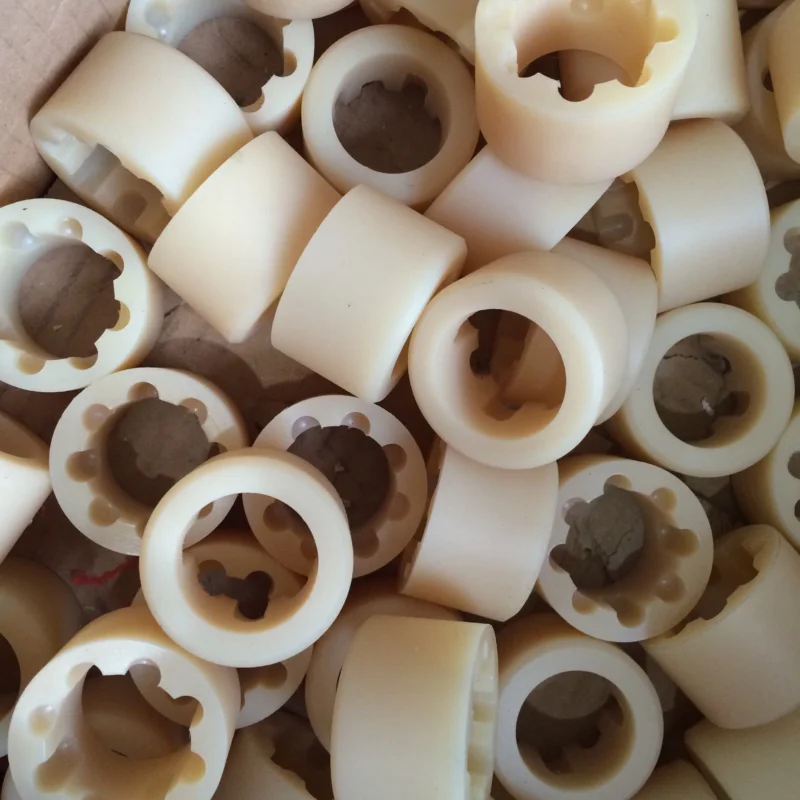Industria JST
Provides professional CNC plastic machining services
High-Precision Plastics Machining & Processing For Diverse Applications
Plastic materials are favored for CNC machining because of their light weight, cost effectiveness and design flexibility.
Lightweight
The low density of plastics makes them popular for applications that require weight reduction, such as portable electronic devices.
Relación coste-eficacia
Plastic materials are often more economical than metals and are suitable for mass production.
Design Flexibility
Plastics are easy to mold and process, allowing for complex geometries.
Versatile Applications
Plastic materials are used in a variety of industries, including medical, aerospace, electronics and automotive.
Plastic Properties and Applications
JST Industry offers CNC machining services for a wide range of plastic materials to meet the specific needs of different industries with regard to material properties.

Productos sanitarios
Used in the manufacture of disposable medical devices and diagnostic equipment.

Electronics Industry
Used in the manufacture of housings and insulating components for electronic devices.
Automoción
For the manufacture of interior trim and some non-structural components.

Transparency
Transparent plastics such as acrylic are used for products that require optical clarity, such as display racks and lamps.

CNC Plastic Machining Parts
Plastic Surface Treatments and Finishing

Painting: Painting services are offered in a variety of colors to meet customers’ individual needs for product appearance.
Chapado: Plating improves the abrasion resistance and electrical conductivity of plastic parts.
Pulido: Provides a smooth touch and high gloss to plastic surfaces.
Laser Engraving: Provide fine marking and customized pattern design.
Casos de mecanizado de aleaciones y comentarios
Electronics Designer, Shenzhen, China
“When designing a new smartwatch, we chose JST Industry for CNC machining of the plastic case. They not only met our stringent requirements in terms of machining accuracy, but also provided valuable advice on design optimization. The look and feel of the final product exceeded our expectations, thanks in large part to JST Industry’s professional services.”
Empresa de dispositivos médicos, Boston, EE.UU.
“For our disposable medical devices, JST Industry demonstrated extreme machining precision and a deep understanding of medical-grade plastic materials. Their CNC machining services ensure the consistency and reliability of our products, which is critical for medical applications. In addition, we were impressed with their quick response and flexible production schedule.”
Automotive Interior Supplier, Stuttgart, Germany
“JST Industry’s CNC plastic machining technology provides the precision and sophistication we need in the manufacturing of automotive interior parts. The plastic parts they machine are not only of the highest quality, but also meet an extremely high standard in terms of surface finish, making our interior products more attractive in the marketplace.”
Consumer Electronics Company, Tokyo, Japan
“Our products require the use of specialty plastic materials to meet specific electrical and chemical properties.JST Industry’s expertise and experience in CNC machining of plastics allowed us to quickly transition from the prototype stage to mass production. The quality of their machining and attention to detail have brought our products to a high standard of performance and appearance.”
Preguntas frecuentes
P: Estoy diseñando un nuevo producto que requiere mecanizado CNC para crear un prototipo y el producto final. Cómo selecciono el material más adecuado para el mecanizado CNC de mi proyecto?
R: En JST Industry, sabemos que elegir el material de mecanizado CNC adecuado es fundamental para el diseño del producto. En primer lugar, debe considerar el escenario en el que se utilizará su producto, incluidas las propiedades mecánicas requeridas, la resistencia a la temperatura, la resistencia a la corrosión y la rentabilidad. Ofrecemos una amplia gama de materiales, entre los que se incluyen aleaciones de aluminio, acero inoxidable, latón, diversas aleaciones y muchos plásticos. Nuestro equipo de expertos puede ayudarle a seleccionar el material más adecuado para sus necesidades específicas y proporcionarle asesoramiento experto en optimización del diseño para garantizar un proceso de mecanizado CNC eficaz y rentable.
Q: Me gustaría saber cómo afecta la selección de diferentes materiales en el proceso de mecanizado CNC al coste final del mecanizado.
En JST Industry, somos conscientes de que la selección del material tiene un impacto significativo en los costes de mecanizado CNC. El tipo de material, la dificultad de mecanizado y la disponibilidad en el mercado influyen en su precio. Por ejemplo, el acero se utiliza ampliamente debido a su menor coste, mientras que las aleaciones de titanio y ciertas aleaciones avanzadas son más caras debido a su mayor coste de material y dificultad de mecanizado. Además, la maquinabilidad del material también afecta al coste; por ejemplo, las aleaciones de aluminio suelen ser menos caras por su facilidad de mecanizado. Nuestro sistema de presupuestos tiene en cuenta todos estos factores para garantizarle la estimación de costes más precisa.
Q: ¿Cuáles son algunas prácticas de diseño que pueden ayudarme a reducir los costes de mecanizado al diseñar piezas mecanizadas con CNC?
P: Tengo requisitos estrictos de precisión en mis productos, ¿qué tolerancias pueden alcanzarse con el mecanizado CNC y cómo afecta esto a la calidad del producto final?
R: En JST Industry, nuestros servicios de mecanizado CNC son capaces de cumplir tolerancias extremadamente altas, a menudo de ±0,01 mm, gracias a nuestros avanzados equipos de mecanizado y estrictos procesos de control de calidad. Esta capacidad de mecanizado de alta precisión garantiza la consistencia y fiabilidad de las piezas, lo que es especialmente importante para los ensamblajes que requieren un ajuste de alta precisión. Nuestro sistema de garantía de calidad incluye múltiples inspecciones y calibraciones para asegurar que cada pieza se ajusta a los planos de diseño y las tolerancias del cliente, garantizando así la calidad del producto final.




